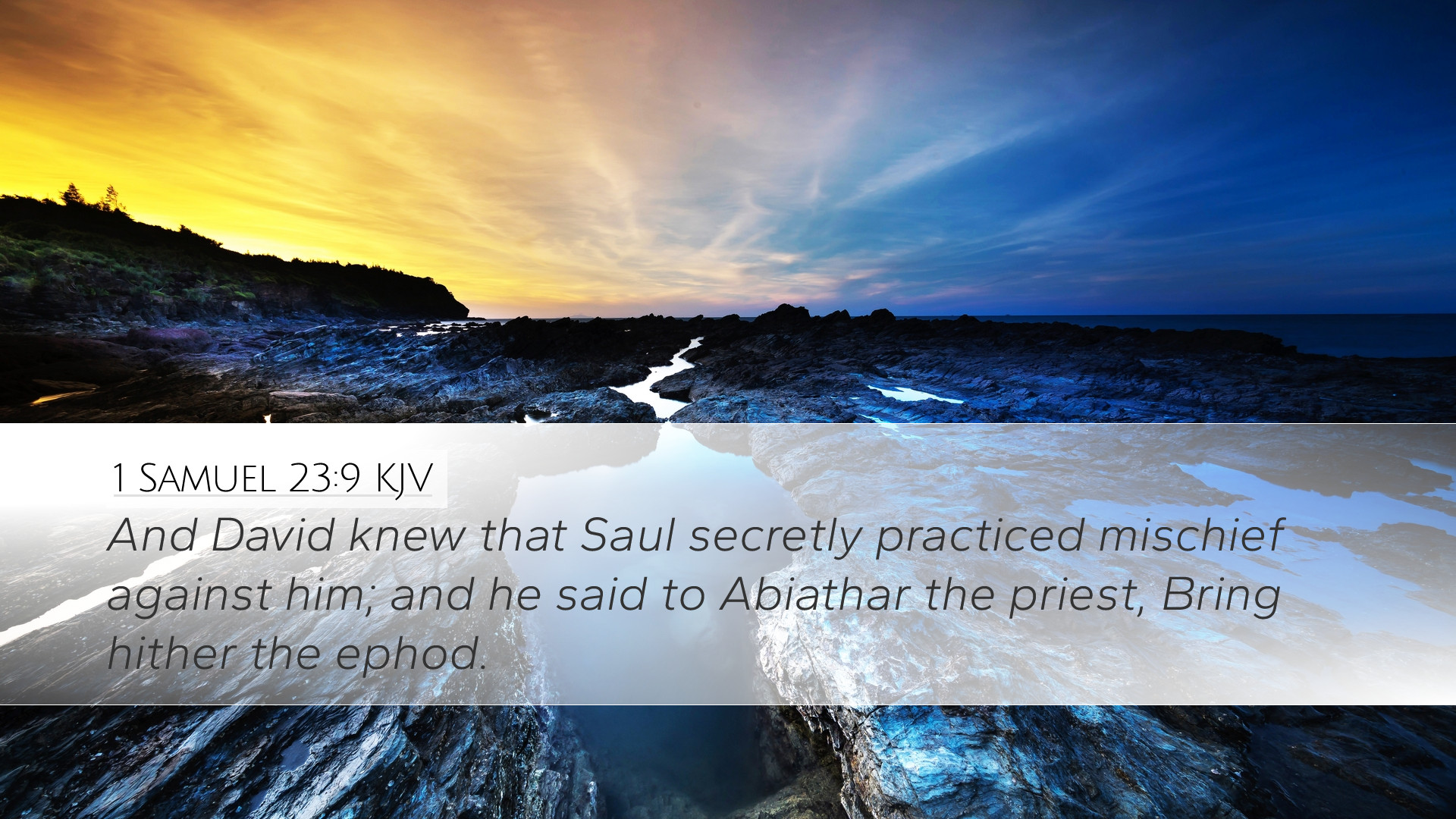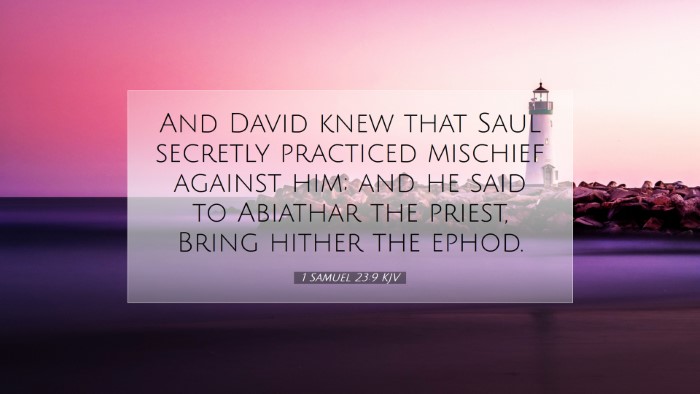Bible Commentary on 1 Samuel 23:9
1 Samuel 23:9 states: "And David knew that Saul secretly practiced mischief against him; and he said to Abiathar the priest, Bring hither the ephod." This verse is pivotal in understanding the dynamics of the relationship between David and Saul, as well as the significant role of divine guidance in David's leadership.
Contextual Analysis
The context surrounding this verse is crucial for a deeper understanding. David is on the run from Saul, who is intent on killing him. The urgency in David’s recognition of Saul's malice underscores the biblical theme of divine protection over anointed leaders. Throughout the history recorded in 1 Samuel, we witness the contrast between Saul’s jealousy and David’s reliance on God.
Insights from Public Domain Commentaries
Matthew Henry's Commentary
Matthew Henry emphasizes the danger of David's situation and highlights his use of the ephod as a means of seeking God’s counsel. He notes that David’s awareness of Saul’s plotting shows his spiritual discernment. Henry writes that, unlike Saul, who acted on his own destructive impulse, David turns to God for guidance:
- Divine Guidance: David's request for the ephod reflects his understanding of the necessity of divine revelation. In times of peril, he seeks to discern God's will.
- Recognition of Malice: Henry asserts that David's recognition of Saul's intentions speaks to the wisdom that comes from divine insight. It highlights the spiritual conflict between Saul and David as a battle not just of armies, but of faith and obedience.
Albert Barnes' Notes on the Bible
Albert Barnes provides additional dimensions to the interpretation of this verse. He comments on the seriousness of David's plight and the strategic importance of the ephod in this context:
- The Use of the Ephod: The ephod was a priestly garment used for inquiring of God. David’s call for the ephod signifies his recognition that human wisdom is insufficient against the malice towards him; he needs heavenly guidance.
- Impending Danger: Barnes highlights that David’s fear is justified given Saul's persistent pursuit. The importance of prayer and seeking God's direction in critical moments is a theme that resonates throughout scripture.
Adam Clarke's Commentary
Adam Clarke elaborates on the political and emotional ramifications of Saul's pursuit. His commentary provides insight into David’s leadership approach during tumultuous times:
- Desperation and Faith: Clarke discusses how David’s desperation leads him to prayer and consultation with the Lord. This act of bringing the ephod before Abiathar the priest illustrates a leader who, in dire need, seeks spiritual counsel.
- The Role of Abiathar: Abiathar, who escaped the massacre at Nob, serves as a critical ally to David, symbolizing the importance of faithful companionship in moments of trials. Clarke suggests that having the priestly counsel strengthened David’s resolve.
Theological Implications
This verse surfaces key theological themes relevant to contemporary ministry and scholarship:
- God’s Sovereignty: The verse illustrates how God's sovereign choice of David as king does not exempt him from adversity. It serves as a reminder that divine election often comes with significant trials.
- Importance of Seeking God: David’s invocation of the ephod teaches the necessity of seeking God's will. In ministry, this is foundational as leaders must rely on God’s guidance through prayer and the scripture.
- Spiritual Discernment: David's ability to discern Saul's intentions prompts reflection on the need for spiritual discernment in the lives of believers today, especially in navigating conflicts and challenges.
Application for Today’s Leaders
Pastors and leaders can draw vital applications from this verse:
- Continued Vigilance: Like David, leaders must remain vigilant against those who may seek to harm them or their ministries. Recognizing threats—be they personal, doctrinal, or relational—is essential for stewardship.
- Developing a Culture of Prayer: Foster an environment where seeking God’s counsel is a community norm. Implementing prayer meetings and encouraging personal prayer can fortify a church against spiritual attacks.
- Empowering Others: Just as Abiathar supports David, raising up trusted leaders and allies helps build a robust ministry. Relationships built on mutual support and relying on God can encourage strong leadership.
Conclusion
The complexities involved in 1 Samuel 23:9 present a profound reflection on leadership, trust in God's guidance, and the critical nature of community support. As we meditate on this verse, let it inspire us to seek divine wisdom in our challenges and to foster relationships and environments conducive to spiritual growth.


